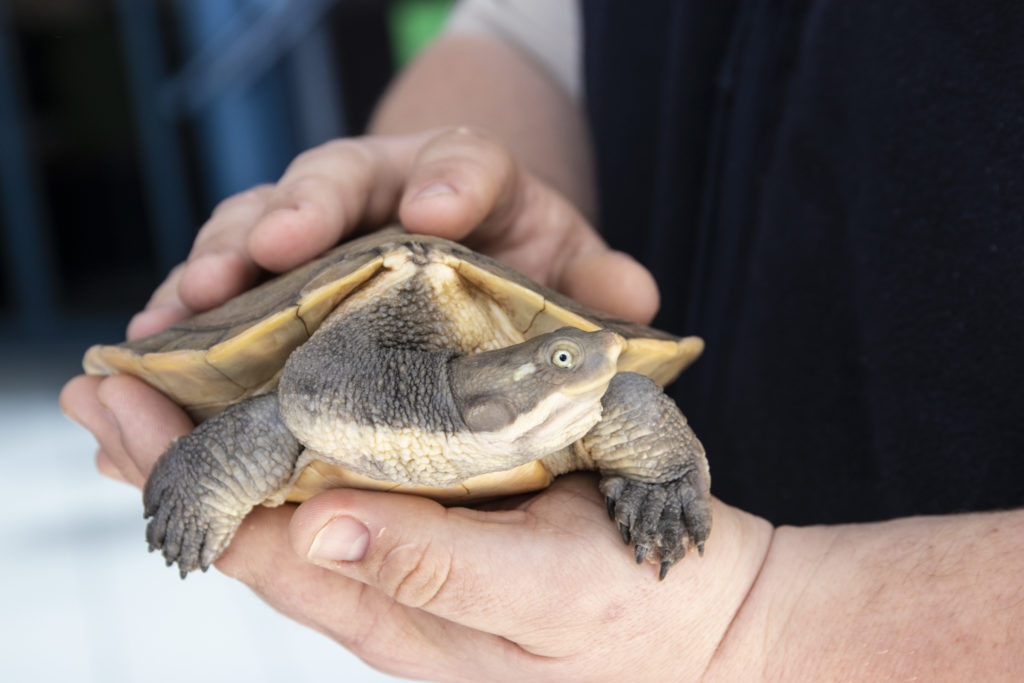Are you considering surrendering your pet?
We understand that sometimes situations occur or life circumstances change and you may find you can no longer take care of your pet.
We also know that giving up an animal is never an easy decision – so thank you for reaching out to us. We will provide no-judgement advice on the best choice for you and your pet. We are here to help.
We understand it can be hard to know if you are making the right choice or not. Alternative options for support may well be available to you and your pet. We encourage you to first explore the FAQs below to see what might work for you.
Did you know: You can bring in a litter of kittens to surrender into our care with their mother and we will (i) take the kittens into our care for rehoming and (ii) desex mum free of charge and return to her to you (you’ll need to arrange your own transport to collect mum)*. For more information please email [email protected]
*This offer is open to holders of pension and concession cardholders only.
What to do if you believe surrendering your pet is the only option:
Please note that, to help manage shelter inflows and ensure all animals can be assessed by our staff in a timely manner, we strongly advise against bringing your animal to our shelters before an appointment has been made.
Instead, we ask that the following steps are taken:
- Complete the relevant online form below
- Please take your time and answer each question as fully as you can – doing so gives us the best possible information about your animal to ensure the best possible outcome.
- A member of our team will be in touch to organise a time for you and your pet to attend the Lonsdale Shelter
- Please note that surrender fees may apply. In saying this, our staff are considerate and understanding to individual financial situations and can discuss options with you.
RSPCA South Australia can only accept surrenders from the microchipped owner.
Surrendering is by appointment only. Our staff will call you (via a private number) after we receive your completed surrender application form. Please be aware that the entire surrender process may take up to two weeks to complete.
If you live in the Northern suburbs, please consider your local animal shelter.
*Please note that whilst surrender fees apply, our staff are considerate and understanding to individual financial situations and can discuss options with you*
Some common issues and possible solutions for you and your pet:
My pet doesn’t follow my cues as I ask.
The old saying isn’t true. You can teach an old animal new tricks – and it’s sometimes easier than training a young pet! It is never too late to begin a training program with your pet.
We strongly recommend you:
- Speak with a trainer. Chat about the main issues you’re having and your trainer can work with you to achieve your goals. We only recommend force-free trainers.
- Exercise your pet. Increase your pet’s daily exercise to help calm and reduce excessive energy.
I think my pet may have behavioural problems.
If your pet cries or howls when left home alone; digs, chews or destroys your house; or would simply benefit from basic manners and house training, training may help. Behaviour modification programs are often successful in enabling owners to keep their pets, and enjoy a long and fulfilling relationship.
We strongly recommend contacting a force-free trainer to see if they can support and help you.
We also recommend trying some or all of the following tips:
- Prevent boredom. It’s important to keep your dog’s active mind entertained. Freeze dog treats so your pet has to work to get them. Turn on the radio or television, or search “Through A Dog’s Ear” on YouTube for exciting footage for your dog to enjoy.
- Increase social time. Expand your pet’s world and increase social time by going for walks, teaching it tricks and/or rotating its toys.
- Consider dog-walkers or sitters. If you are short on time, consider force-free dog walkers and pet service providers online.
- Consider your pet’s environment. All pets benefit from environmental enrichment. Regular new toys to keep your furry friend stimulated while you’re away will make a difference to their everyday life.
My pet keeps escaping.
Animals attempt escape for many reasons: loneliness, boredom, territorial roaming, mate-seeking, an underlying curiosity or anxiety.
We recommend these tips:
- Keep your pet entertained. If you are short on time, consider force-free dog walkers and pet service providers online.
- Increase social time. Expand your pet’s world and increase social time by going for walks, teaching it tricks and/or rotating its toys.
- Look at your fencing. Ensure your fence is secure and high enough to safely contain your dog. You can also bury chicken wire under the ground at the base of the fence so your pet can’t dig underneath.
- Bring your dog indoors.
- Have your pet desexed. If your pet is neutered or spayed it will be less likely to go in search of a mate. The National Desexing Network helps you find vets in your area at discount rates. Learn more here.
My pet is showing signs of aggression.
If your pet is displaying signs of aggression, depending on the level of severity, it may be possible to successfully treat and manage these issues. It is crucial to diagnose the type of aggression and its triggers, so what provokes this behaviour can be identified.
We strongly recommend contacting a force-free trainer to see if they can support and help you.
My pet doesn’t get along with my other animals.
It can be stressful when your pets are not getting along, but training and careful management may help. In the beginning it’s critical to take precautions. Separate your animals and ensure they are not together unsupervised. Comfort between all of your pets may occur very gradually and requires patience and dedication.
We recommend the following:
- Consider your animal’s environment. Is your pet healthy, happy and well exercised? These factors can influence anxiety and anti-social behaviour.
- Reward good behaviour. Rewards through attention and food can go a long way. Reinforce positive interaction, rather than reprimanding undesirable behaviours.
- Seek professional help. A force-free trainer may be able to support and help you.
I’m moving and unable to take my pet.
Keeping a pet while renting can be difficult. Very few leasers specifically state that they allow pets, however you might find they’re open to negotiate.
Don’t rely on rental ads – often landlords and real estate agents will consider pets if you approach them directly. Offer to sign an agreement or pay a deposit and encourage the owner/landlord to meet your well-behaved, well-groomed flea-free pet.
A pet resume may also be your key to success. Consider keeping a veterinary history, up-to-date vaccination certificates and a behaviour profile for your pet. This can then be handed to prospective real estate agents or landlords during your application process, helping them get to know your pet and make an informed decision.
For more information and tips, visit our pets in rentals page.
I need financial assistance to get my pet desexed or to cover expensive medical treatment.
Several options may be available to you:
- Consider VetPay. If you are struggling financially VetPay may be able to offer payment solutions. Find out more here.
- Negotiate a payment plan with your vet. If you’re a client in good standing, your vet may be happy to work out a weekly or monthly payment plan so that you don’t have to pay the entire cost up front.
- Seek a second opinion. City-based vets can have higher fees. Seek out a second opinion from another vet in the outer suburbs. They may offer the services for less or even an alternative approach.
- Consider generic brand medication. If your vet offers you a generic medication, this may help to lower your costs.
- Purchase pet insurance. While insurance may not help in the current crisis, you should consider purchasing pet health insurance for future medical needs as it can help minimise vet and hospital costs. Find out more here.
I love my pet but I can’t afford to keep it.
Have you considered the following options?
- Re-evaluate your current spending. Consider what costs you have that you might be able to reduce, such as ongoing memberships or subscriptions you may not be using that could be cancelled or swapped for lower cost alternatives. For example, swap a gym membership for exercising with your dog or go from cable to a streaming service. These costs can add up over time and may help with the extra money needed for your furry friend.
- Consider generic brand food. Ask your vet for advice on how to reduce feeding costs while ensuring your pet gets the nutrition it needs.
- Contact your local food shelter. Pet food is a commonly donated item you may be able to access.
I am having trouble caring for my pet at the moment.
We understand circumstances can change and sometimes all we need is a little support. In some cases, short-term respite care can help restrengthen the bond between you and your pet.
At RSPCA South Australia, we do have limited emergency boarding facilities that can at times be accessed. Please contact us to see if you might be eligible for this support.
I think I’m allergic to my pet.
Begin by testing. Believe it or not, many people think they are allergic to their pets, but the cause of the reaction comes from something else – such as flea treatment. The only way to verify your allergy is through a quick test from your local GP.
If you have a confirmed allergy, love your pet and just need some good advice on how to live happily ever after, try these tips:
- Create a pet-free zone in your home, such as your bedroom, and do not allow your pet to access this area. Often, it is not a small exposure to an allergen that triggers a reaction, but increased exposure over time.
- Wash your pet regularly, ensuring you use pet-safe shampoos. Bathing them and trimming their fur helps prevent the build-up of old and loose hair.
- Groom your pet regularly. Having your dog’s hair trimmed has some great advantages. It vastly reduces the amount of hair and shedding around the house, hence the quantity of allergens as well – and during the summer it can be a life-saver for the longer-haired ones! Investment in a good pair of pet shears means you can do it from home.
- Keep your home clean and invest in an air purifier. Regularly wash your bedding, carpet and curtains. If your pet rides in the car with you, consider using washable covers.
I just don’t want my pet anymore.
Many options exist for easily rehoming your pet with new owners. It’s also important to prepare your pet for this change in their life.
It can often take weeks or even months to find your pet a new home. To increase your pet’s chances, ensure he or she is desexed, groomed and vaccinated. If your pet is a purebred, you could try contacting the original breeder.
Sometimes, the best homes are found with people who already know and love your pet, so try asking family and friends too.
ONLINE SURRENDER FORMS BELOW:
If you wish to discuss options for surrendering an animal that is not a dog, cat or rabbit, please email our surrenders team on [email protected] or call 1300 4 777 22.
FAQs about RSPCA South Australia’s surrender process:
What is the surrender process?
RSPCA South Australia’s goal is to find the best possible forever home for every healthy or treatable animal that comes into our care. If you would like to surrender your pet, please fill out our online forms to make an appointment.
Once the form has been received, our staff will contact you to make a surrender appointment. You must bring personal identification with you, as well as proof of pet ownership and any veterinary information.
Once you sign your pet over to RSPCA South Australia, it becomes the property of RSPCA South Australia. All surrendered animals undergo medical and behavioural assessment according to nationally standardised guidelines, to ensure they are fit and healthy for safe rehoming into the community.
Do I have to pay a surrender fee?
RSPCA South Australia asks that you consider making a contribution at the time of surrender to help with the cost of caring for your pet while he or she is in our care – including behavioural assessments and training, medical care, microchipping, vaccinations, desexing, sheltering costs, etc.
Should I bring anything with my animal when attending my surrender appointment?
When surrendering your pet, you will need to provide personal identification such as your driver’s license, proof of ownership of the animal, such as microchip paperwork from your council, and any veterinary information for your pet.
What happens to my animal after it is surrendered?
All surrendered animals undergo medical and behavioural assessment according to nationally standardised guidelines, to ensure they are fit and healthy for safe rehoming into the community.
Can you guarantee my animal will be rehomed?
While RSPCA South Australia cannot guarantee an adoption outcome for every animal surrendered to us, we rehome 9 out of every 10 animals that come into our care. All surrendered animals undergo medical and behavioural assessment according to nationally standardised guidelines, to ensure they are fit and healthy for safe rehoming into the community. Once assessed as suitable to rehome, we will find the animal a home – no matter how long it takes.
Is there a time limit on my animal if it goes up for adoption?
No. RSPCA South Australia does not impose time limits on any animals in our shelter. Every healthy and/or treatable animal that comes into our care is given as much time as it needs to find a loving new forever home.
Can I follow up after surrendering to learn how my animal is going?
Unfortunately this is not possible, due to legal and privacy constraints.








